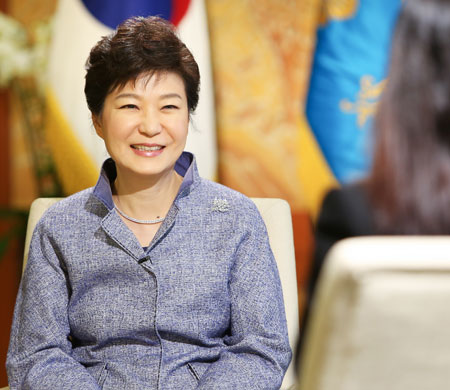- California Assembly OKs highest minimum wage in nation
- S. Korea unveils first graphic cigarette warnings
- US joins with South Korea, Japan in bid to deter North Korea
- LPGA golfer Chun In-gee finally back in action
- S. Korea won’t be top seed in final World Cup qualification round
- US men’s soccer misses 2nd straight Olympics
- US back on track in qualifying with 4-0 win over Guatemala
- High-intensity workout injuries spawn cottage industry
- CDC expands range of Zika mosquitoes into parts of Northeast
- Who knew? ‘The Walking Dead’ is helping families connect
Park: “no handshake with Abe”
President calls Japan prime minister ‘hypocrite’ ahead of Davos

President Park Geun-hye smiles during an interview with CNN International at Cheong Wa Dae, Tuesday. (Courtesy of Cheong Wa Dae)
By Kang Seung-woo
President Park Geun-hye has pulled no punches against Japan Prime Minister Shinzo Abe, pressing him to stop being a hypocrite.
It may not look out of the ordinary, considering the two neighbors’ frosty relations, but one thing stands out – she is using foreign media outlets to deliver her message ahead of the World Economic Forum (WEF) in Davos, Switzerland, where world leaders are expected to gather next week.
Few would be surprised if Park uses the WEF to condemn Abe’s efforts to ignore Japan’s atrocities committed against Korea, China and other Asian countries during World War II.
But she’s already thrown down the gauntlet, saying in an interview with Bloomberg that she will not shake hands with Abe, who will also be in Davos.
“It’s not a matter of a handshake,” she told the business wire. “If you put yourself in Korea’s shoes, I would in fact ask the question of whether you can actually pretend nothing has happened, and just move forward as if nothing had happened.”
She repeated her tone during an interview with CNN at Cheong Wa Dae.
Some analysts say that the Park has put Abe in the hot seat. “In the past, the Japanese government clearly articulated its official position about these historical issues through the Murayama Statement, as well as the Kono Statement. These statements are exactly what allowed the Korea-Japan relationship to move forward,” Park told Bloomberg.
The statements, named after former Chief Cabinet Secretary Yohei Kono and former Prime Minister Tomiichi Murayama, are a clear apology to the victims of Japanese aggression during World War II.
“But with the inauguration of the new Japanese administration, we’re hearing various repeated comments that seem to either overturn or deny these previous statements that were officially held in the past. And one must ask, under this situation, how could we possibly be expected to move the Korea-Japan relationship forward?” she added.
“This issue is something that hinges entirely on the attitude of the Japanese. And we sincerely hope that the Japanese make efforts to promote a forward-looking advancement of the Korea-Japan relationship on the basis of a correct perception and understanding of history.”
Relations between Seoul and Tokyo have been frayed due mainly to Japan’s refusal to address long-running grievances over sexual slavery and other atrocities committed during its 1910-45 colonial rule of the Korean peninsula and its repeated claims to Korea’s easternmost islets of Dokdo.
The relations worsened recently after Abe paid his respects late last year at the Yasukuni Shrine that houses 14 Class A war criminals from the Second World War.
“Since last year, Korea has urged Japan to change its attitude toward history and, more precisely, sexual slavery. However, Abe’s visit to Yasukuni put a damper on Korea’s efforts,” said Jo Yang-hyeon, a professor at the Korea National Diplomatic Academy.
He added that Abe has said he is open to talks with Korea and China, imputing the bilateral political deadlock to the countries.
“However, this time, by saying there will be a summit with Japan following a change in Abe’s perception of history, Park has put the ball into his court,” Jo said.
The professor predicted that there may be a meeting between Park and Abe in the near future, considering the prime minister’s situation.
“Abe has walked a tightrope between right-wing nationalists and those calling for stable diplomatic ties with neighboring countries and he is facing much pressure from the latter,” Jo said.
“If Abe accepts the demand, relations may warm up.”












![배우 김민희와 홍상수 감독[스타뉴스]](http://www.koreatimesus.com/wp-content/uploads/2025/04/20250408101705671-120x134.jpg)

